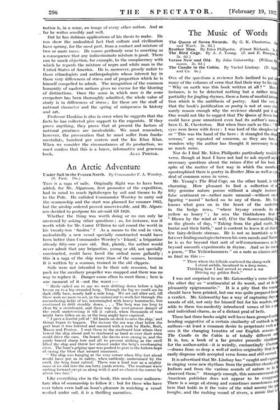The Music of Words
The Queen of Seven Swords. By G. K. Chesterton. and Ward. 2g. 6d.)
ONE of the questions a reviewer feels inclined to put many of the volumes of verse that find their way to his to " Why on earth was this book written at all ? " Here, instance, is to be detected nothing but a rather irrit partiality for jingling rhymes, there a form of morbid int tion which is the antithesis of poetry. And the very that the book's justification as poetry is not at once clear surely reason enough why the reviewer should put it One would not like to suggest that The Queen of Seven S could have gone unnoticed even had its author's name been G. K. Chesterton. But when lines such as this : eyes were fierce with fever : I was lord of the sleepless or " This was the hand of the hero : it strangled the dray scream," are repeated ad nauseam, as they are here, wonders why the author has thought it necessary to so much noise.
Nor do I find Mr. Eden Phillpotts particularly readable verse, though at least I have not had to ask myself any necessary questions about the raison d'être of his book. spite of the matter of fact way in which the months apostrophised there is poetry in Brother Man as well as a; deal of common sense in verse.
Mr. Young's The Bird Cage, on the other hand, is s charming. How pleasant to find a collection of fifty genuine nature poems without a single instance false sentiment or—rather more unusual—without one figuring " moral " tacked on to any of them. Mr. Yo knows what goes on in the heart of the underb in the hedge rows, "where bryony crowds its yellow as honey " ; he sees the thistledown float " Blown by the wind at will, O'er the flower-nodding as the ghosts of day, " Taking from the glad earth, burial and their birth," and is content to leave it at that few fairy-delicate stanzas. He is not so inartistic as to for ever finding analogies between his own moods and Nature lie is as far beyond that sort of self-consciousness as he beyond uncouth experiments in rhyme. And so he can a poem, The Yellowhammers " on a note as elusive and, as final as this :— " There where the hillside scattered the sheep-walk I stood awhile, becalmed in a deep muse, Thinking how I had served so sweet a use Driving my golden flock."
I was not surprised to see Mr. Galsworthy's verse disc the other day as " sentimental at its worst, and at its pleasantly epigrammatic." It is a pity that the corn should have been printed, but one was quite prepared for a verdict. Mr. Galsworthy has a way of capturing days moods of old, not only for himself but for his readers, w adds to these too-modestly introduced verses of his a (I and individual charm, as of a distant peal of bells.
These last three books might well have been grouped till heading suggestive of a certain similarity of outlook in authors—at least a common desire to perpetuate each as sees it the changing beauties of our English seasons The Candle in the Cabin is of totally different 0 It is, too, a book of a far greater prosodic signifi for the author-artist—it is weirdly, enchantingly hitt° —draws from so deep a well of native originality that he easily dispense with accepted verse forms and still succeed.
It is advertised that Mr. Lindsay has " caught and eNI) in singing verse new rhythms from the primitive chants Of Indians and from the various sounds of nature as lit observed them." Strangely enough, this announcement of American publisher does not appear to be exaggtn There is a surge ot. strong and sometimes monotonous here that holds in it the voice of the wind among the boughs, and the rushing sound of rivers, a music that truest sense of the word free : a music of " The curling VCS that " Wind and 'Wind," Before - they liteak,"--of he Mountains with Storms for War-Bonnets," of the Red lads courtship in a land that is still unspoiled and wild ugh to inspire, and justify, the highly picturesque and roes phraseology employed. The Candle in the Cabin e of the most refreshing and " full-blooded " volumes of
try I have read for many a day. H. M.















































 Previous page
Previous page